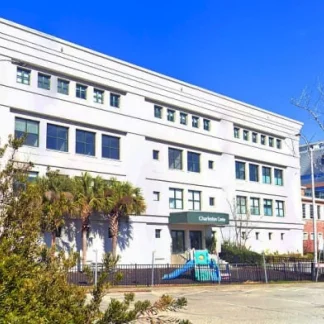Lowcountry Psychotherapy
Lowcountry Psychotherapy is a private rehab located in Charleston, South Carolin...
Charleston Center is a comprehensive drug and alcohol rehab for adolescents and adults in Charleston, South Carolina. They offer dual diagnosis care, medically supervised detox, intervention services, and inpatient, outpatient, and aftercare programs. Dedicated services for teens, young adults, and persons living with HIV/AIDS are available.
Charleston Center, in Charleston, South Carolina, is an addiction recovery program for teens and adults offering intervention services, medically supervised detox, and inpatient, outpatient, and aftercare programs. They also provide dedicated programs for young adults, adolescents, persons with HIV/AIDS, and persons with co-occurring addiction and mental health disorders.
Clients undergoing detox at Charleston Center receive round the clock medical supervision and may be prescribed FDA approved medications to ease withdrawal symptoms and prevent potentially serious complications.
Charleston Center’s inpatient program allows clients to focus on their recovery in a private, home like setting. There, they engage in intensive, 12 step focused, trauma informed psychotherapy, including individual, group, and family counseling. Clients also develop recovery focused life skills to support long term sobriety, including training in stress and anger management, self care, wellness, coping, and relapse prevention.
Charleston Center supports sustained recovery through a robust continuum of care aligned with clients’ evolving needs. Levels of care include intensive outpatient (IOP), standard outpatient, sober living, and aftercare programs. In addition to ongoing counseling and recovery skills development, clients may receive ancillary services to facilitate community, family, and workforce reintegration. This may include career counseling, peer coaching, 12 step program induction, and medical, mental health, and social services referrals.
Charleston Center is accredited by CARF and SAMHSA. They accept private insurance, Medicare, Medicaid, and self pay.
Contact us for more information: (843) 958-3300

Connect with Charleston Center by calling their admissions team directly.
(843) 958-3300 Website Get DirectionsThe Commission on Accreditation of Rehabilitation Facilities (CARF) is a non-profit organization that specifically accredits rehab organizations. Founded in 1966, CARF's, mission is to help service providers like rehab facilities maintain high standards of care.
CARF Accreditation: Yes
The Substance Abuse and Mental Health Services Administration (SAMHSA) is a branch of the U.S. Department of Health and Human Services. Established in 1992 by congress, SAMHSA's mission is to reduce the impact of substance abuse and mental illness on American's communities.
SAMHSA Listed: Yes
Research clearly demonstrates that recovery is far more successful and sustainable when loved ones like family members participate in rehab and substance abuse treatment. Genetic factors may be at play when it comes to drug and alcohol addiction, as well as mental health issues. Family dynamics often play a critical role in addiction triggers, and if properly educated, family members can be a strong source of support when it comes to rehabilitation.
Group therapy is any therapeutic work that happens in a group (not one-on-one). There are a number of different group therapy modalities, including support groups, experiential therapy, psycho-education, and more. Group therapy involves treatment as well as processing interaction between group members.
Trauma therapy addresses traumatic incidents from a client's past that are likely affecting their present-day experience. Trauma is often one of the primary triggers and potential causes of addiction, and can stem from child sexual abuse, domestic violence, having a parent with a mental illness, losing one or both parents at a young age, teenage or adult sexual assault, or any number of other factors. The purpose of trauma therapy is to allow a patient to process trauma and move through and past it, with the help of trained and compassionate mental health professionals.
Group therapy is any therapeutic work that happens in a group (not one-on-one). There are a number of different group therapy modalities, including support groups, experiential therapy, psycho-education, and more. Group therapy involves treatment as well as processing interaction between group members.
Trauma therapy addresses traumatic incidents from a client's past that are likely affecting their present-day experience. Trauma is often one of the primary triggers and potential causes of addiction, and can stem from child sexual abuse, domestic violence, having a parent with a mental illness, losing one or both parents at a young age, teenage or adult sexual assault, or any number of other factors. The purpose of trauma therapy is to allow a patient to process trauma and move through and past it, with the help of trained and compassionate mental health professionals.
Trauma therapy addresses traumatic incidents from a client's past that are likely affecting their present-day experience. Trauma is often one of the primary triggers and potential causes of addiction, and can stem from child sexual abuse, domestic violence, having a parent with a mental illness, losing one or both parents at a young age, teenage or adult sexual assault, or any number of other factors. The purpose of trauma therapy is to allow a patient to process trauma and move through and past it, with the help of trained and compassionate mental health professionals.
Lowcountry Psychotherapy is a private rehab located in Charleston, South Carolin...
Charleston Pediatric Rehabilitation is a private rehab located in Charleston, So...
Alternatives Life Improvement Center is a private rehab located in Charleston, S...
South Carolina STRONG is a non-profit rehab located in North Charleston, South C...